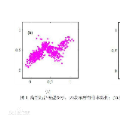In this letter, we propose a Gaussian mixture model (GMM)-based channel estimator which is learned on imperfect training data, i.e., the training data are solely comprised of noisy and sparsely allocated pilot observations. In a practical application, recent pilot observations at the base station (BS) can be utilized for training. This is in sharp contrast to state-of-theart machine learning (ML) techniques where a training dataset consisting of perfect channel state information (CSI) samples is a prerequisite, which is generally unaffordable. In particular, we propose an adapted training procedure for fitting the GMM which is a generative model that represents the distribution of all potential channels associated with a specific BS cell. To this end, the necessary modifications of the underlying expectation-maximization (EM) algorithm are derived. Numerical results show that the proposed estimator performs close to the case where perfect CSI is available for the training and exhibits a higher robustness against imperfections in the training data as compared to state-of-the-art ML techniques.
翻译:在这封信中,我们提出了一个基于高斯混合模型(GMM)的频道估计器,根据不完善的培训数据来学习,即,培训数据完全由杂乱和分散的试点观测组成。在实际应用中,基地站最近的试点观测可用于培训。这与最先进的机器学习(ML)技术形成鲜明的对照,在这种技术中,由完美的频道状态信息(CSI)样本构成的培训数据集是一个先决条件,通常无法负担。特别是,我们提议了一个适应GMM的培训程序,该程序是一个基因化模型,代表了与特定BS电池相关的所有潜在渠道的分布。为此,对基本的预期-最大化(EM)算法进行了必要的修改。数字结果显示,拟议的估计器在具备完美的CSI进行培训和展示时,与培训数据不完善相比,相对于最先进的ML技术而言,与培训数据不完善的情况很接近。



